Arthritis is a very painful and potentially disabling disease or disorder that affects millions of men, women, and children. If you are suffering from arthritis, it can make your life much harder and limit the activities you can do.
In this guide, I will explain what is arthritis and how you can relieve its symptoms with natural remedies.
These home remedies can help treat different types of arthritis, including gout, and the pain and stiffness that they cause.
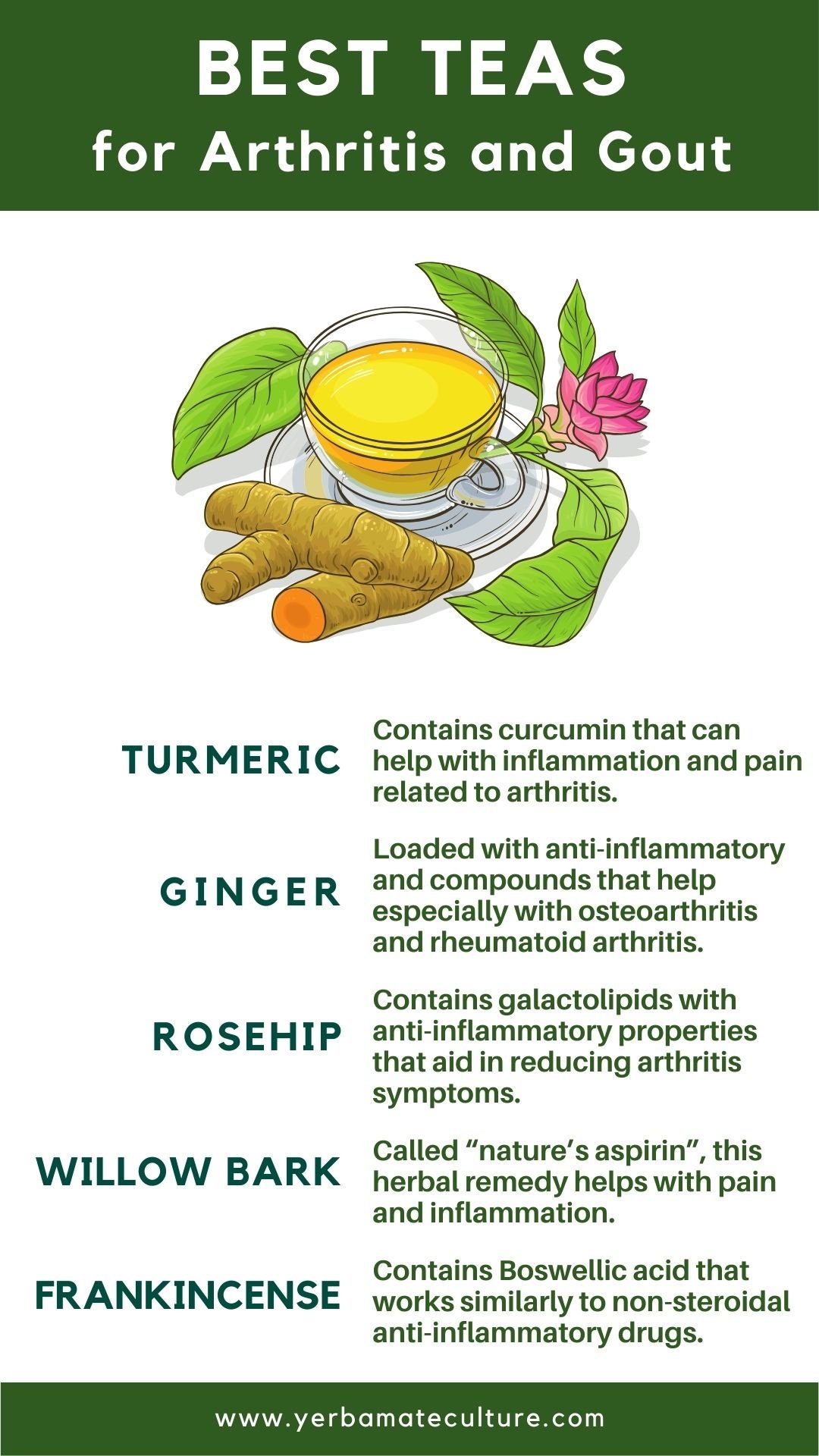
Arthritis often comes with a lifetime of pain and can make it seem impossible to perform some of the simplest daily tasks. For example, it might be hard to even get out of bed in the morning when your joint is as stiff as a board.
After seeing my close friend struggling with arthritis pain, and experiencing some joint aches myself, I wanted to put an effort into finding natural ways to relieve the symptoms.

Pain medication in the form of pills is one option for treating this disorder, but this comes with a high risk of side effects.
I have found herbal teas to be very effective for many health problems from the common cold to acid reflux. So why not for this?
And indeed, after doing some research I found many herbal remedies that have proven to be effective remedies in treating arthritis symptoms.
What Exactly is Arthritis?
Arthritis is a chronic inflammatory disease that affects more than 50 million adults and 300,000 children in the US alone. Age is a big risk factor, which is why middle-aged to senior adults over 60 are more likely to develop the condition.
This condition attacks the joints and muscles, but can also have an impact on the spine or immune system depending on the type of arthritis.
Body parts and joints commonly affected are:
- Jaw, neck, and shoulders
- Hands, wrists, and elbows
- Knees, ankles, and feet
- Spinal joints

Arthritis sometimes causes permanent joint changes that result in hard nodules or “knots” on the finger, knuckle, arm, elbow, or knee.
What makes matters worse is there is no cure for the disease and mainstream treatments provide only temporary relief.
Common Arthritis Symptoms
The two primary symptoms of arthritis are pain and stiffness in one or multiple joints.
The pain may persist or come and go. Pain and stiffness may feel worse in the morning and improve or worsen with movement or rest.
Other common symptoms are:
- The affected joint appears red, swollen, or warm to touch (inflammation)
- Difficulty moving the affected joint
- Stiffness particularly after prolonged sitting
Types and Causes of Arthritis
The nature and location of the symptoms depend on the type of arthritis. The exact cause of the disorder is also not quite known considering there are over 100 different types of arthritis and related conditions.
Three of the most common types of arthritis are:
- Osteoarthritis (OA) – Degenerative in nature. Loss of cartilage due to aging causes the bones to rub together leading to chronic inflammation, pain, and stiffness. This type also shows up in the spine and is known as spinal arthritis.
- Rheumatoid arthritis (RA) – A type of inflammatory arthritis that usually causes swelling and stiffness in multiple joints, especially the small joints in the wrists, hands, or feet. RA develops when the immune system overproduces inflammation that turns around and attacks the joints.
- Gout – Gout is inflammatory arthritis caused by too much uric acid in the body. It typically affects one joint at a time and more often attacks the big toe joint.
Some types of arthritis also affect the eyes, heart, lungs, kidneys, and skin. It can be difficult to accurately diagnose and treat because there are so many different types.
What’s more, mainstream medical treatment for arthritis is not very effective. For example, drugs, such as non-steroidal anti-inflammatory drugs (NSAIDs), treat the symptoms and not the underlying cause.
Not to mention the host of side effects and health risks of pharmaceutical drugs and painkillers when used on a long-term basis.
How to Treat Arthritis and Joint Pain?
While there is no cure for this condition, many patients manage the symptoms with doctor-prescribed treatments.
Common arthritis treatments include:
- Drugs: Painkillers, NSAIDs, corticosteroids, disease-modifying antirheumatic drugs (DMARDs). As mentioned earlier, using drugs is often ineffective and has its downsides. Long-term drug treatment might cause severe side effects and some pain killers are also highly addictive.
- Hot or cold therapy: Heat can help with relaxing muscles and lubricating joints while cold can reduce inflammation, swelling, and pain.
- Physical therapy and exercise: Regular therapy and exercise strengthen joints that have been weakened by damage and inflammation. It can help with improving joint mobility and reducing pain and stiffness.
- Diet rich in anti-inflammatory foods: There are many foods that contain anti-inflammatory compounds that can help with arthritis. For example, garlic, berries, and fish high in omega-3 fatty acids are proven to be beneficial for joint health.

As much as possible, I would try to avoid taking drugs and use the other three methods. Of course, you should always listen to your doctor’s and physiotherapist’s advice first.
5 Best Herbal Teas for Arthritis and Gout
In addition to the treatments listed above, there is science-backed evidence that herbal teas can help with relieving the symptoms of arthritis.
I think it makes sense to combine as many effective methods as possible to get the best results.
1. Turmeric Tea
Turmeric tea is a tasty and healthy drink made from fresh or dried turmeric root. In traditional Indian and Chinese medicine it has been used to treat various conditions for thousands of years.
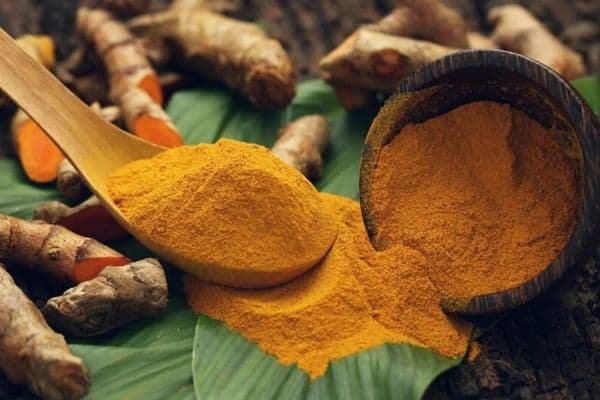
The active ingredient in turmeric is curcumin. It is a compound that has antioxidant and anti-inflammatory effects on the body.
Scientific studies conclude that turmeric has a range of health benefits and can be a potential natural treatment for arthritis pain and inflammation.
Research Results on Turmeric
The results of a study published in the Journal of Medicinal Food suggest that the anti-inflammatory and antioxidant activities of curcumin may help with regulating the amount of inflammation the immune system makes. This systematic review and meta-analysis of several trials show promising results in using turmeric for alleviating the symptoms of arthritis.
Further, curcumin shows minimum side effects and may be as effective as ibuprofen for the treatment of knee osteoarthritis.
I have put together an article to help you find the best turmeric tea products.
2. Ginger Tea
Ginger tea is easy to make and is loaded with anti-inflammatory and analgesic properties that may help with chronic arthritis pain and inflammation.
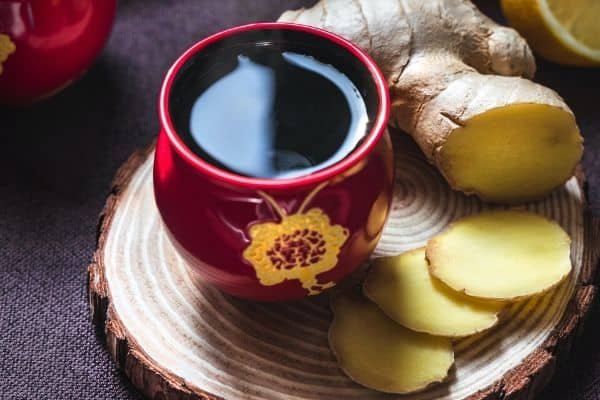
A simple cup of ginger tea made from hot water and grated fresh ginger, tea bag, or ginger extract has many medicinal benefits.
Research Results on Ginger
A study done in 2001 evaluated the safety and efficacy of the concentrated extract of two ginger species in patients with osteoarthritis (OA) of the knee. The two species tested were the Zingiber officinale and Alpinia galanga.
The patients in this trial were experiencing moderate to severe pain. The researchers found that ginger extract had a significant effect on reducing symptoms of OA of the knee. The anti-inflammatory agent in Zingiber officinale was also investigated as a supplementary treatment for rheumatoid arthritis (RA).
Another study from 2014 found that phytochemicals in ginger have potential therapeutic roles in improving RA symptoms.
These studies combined with the experience-based reports related to ginger make it one of the most potential herbal teas for treating arthritis.
If you are planning on buying some ginger tea, read this guide that introduces the top products on the market.
3. Rosehip Tea
Rosehip tea features an unmistakable delicate floral flavor and is rich in vitamins, minerals, and phytochemicals. It is made from the fruit of the wild rose called Rosa canina.

This tea has been used traditionally to treat bladder infections, diarrhea, and diabetes.
Now studies show it may help keep your nagging arthritis symptoms at bay even with its tart aftertaste.
Research Results on Rosehip
Similar to turmeric and ginger teas, rosehip tea is packed with antioxidants and anti-inflammatory agents that can fight osteoarthritis and rheumatoid arthritis. This is based on the results of randomized trials done using standardized rosehip powder.
Rosehip contains galactolipids, a phytochemical with anti-inflammatory actions that consistently reduced pain in patients with arthritis. Another positive finding is that rosehip powder does not produce certain side effects of nonsteroidal anti-inflammatory drugs and aspirin.
Go ahead and try Buddha Teas organic Rosehip Tea. It’s my favorite rosehip tea!
4. Willow Bark Tea
Willow bark’s pain-relieving potential is why different cultures traditionally use it for common ailments such as headaches and menstrual cramps.
If you’re like me, then you might enjoy a hot cup of tea made from dried willow bark chips and brewed into a dark burgundy color tea. I use it as a natural alternative for minor aches and pains instead of reaching for painkillers.

Willow bark comes from a tree of the Salix family commonly known as the willow. Willow bark contains salicin and is sometimes called “nature’s aspirin.”
Research Results on Willow Bark
Studies on willow bark’s analgesic and anti-inflammatory effects discovered that it works similarly to aspirin and relieves mild to moderate pain without adverse effects such as blood clotting.
Furthermore, the flavonoids and polyphenols in willow bark increase its analgesic and anti-inflammatory effects making it a better and safer pain-relieving option.
5. Frankincense/Boswellia Tea
Last but not least, one of the best herbal teas for arthritis is frankincense tea.
Frankincense is an aromatic resin made from the Boswellia serrata tree. This Indian Ayurvedic remedy has been used for many illnesses such as asthma and gut function.
Furthermore, it may help with reducing pain and inflammation caused by osteoarthritis and rheumatoid arthritis.

Research Results on Frankincense
The compounds found in this plant work by blocking the production of hormone-like substances in your body known to trigger joint inflammation.
The anti-inflammatory action of Boswellia is owed to the Boswellic acid it contains. The acid acts in the body in a similar manner to pharmaceutical NSAIDs, a first-line of treatment for arthritis and other inflammatory diseases such as irritable bowel syndrome (IBS).
Tips for Relieving Joint Pain and Inflammation Naturally
Instead of taking drugs, there are also natural ways to treat your joint pain and stiffness.
As you can see, there are many herbal teas that have pain-relieving and anti-inflammatory effects making them potent complementary or alternative remedies for arthritis.
When using herbal teas, one of the most effective ways is to combine them into powerful blends. For example, you can try this golden milk tea recipe, that combines turmeric, ginger, and other ingredients into a powerful herbal remedy.
To wrap things up, here are my best tips for relieving arthritis symptoms:
My 4 Best Tips for Treating Arthritis
- Use hot and cold therapy to ease the pain and stiffness and help you stay active
- Consult a physiotherapist for proper exercises to strengthen your joints and muscles
- Follow a diet that helps reduce inflammation caused by arthritis
- Use herbal teas as a natural way to alleviate your symptoms
Bear in mind that more studies are needed to fully confirm the efficacy of using turmeric, ginger, willow bark, rosehip, and frankincense for treating arthritis.
Also, remember that it might be a good idea to consult your doctor or rheumatologist before using herbal teas. They might be able to give you some additional advice and take into account the possible contraindications with your medication.
Arthritis and Joint Pain FAQ
What is the best herbal tea for treating gout?
Research indicates that ginger tea is the best herbal tea for reducing the pain and inflammation related to gout.
Gout is caused by high uric acid in the blood that builds up in the joints. Ginger tea may help with lowering the levels of uric acid. Other common home remedies include cherry juice and magnesium supplements.
Also, avoiding or reducing the consumption of alcohol and sugar may help with preventing the gout symptoms.
Is hibiscus tea good for treating gout?
Hibiscus tea may help with lowering uric acid levels and reducing gout attacks. However, there is not much evidence to support this and more research is needed to confirm hibiscus teas effectiveness as a gout treatment.
What is the best herbal tea recipe for arthritis and joint pain?
When you are making herbal tea to treat arthritis and joint pain, I recommend including turmeric and ginger. These are the 2 herbs that have the most science-backed evidence related to reducing arthritis symptoms.
You should also include a pinch of black pepper to improve the absorption of curcumin, which is the most important effective compound of turmeric.
You can also add rosehip, Boswellia, or willow bark to make the tea even more effective.
If you don’t like the taste of the tea, add other herbs, like peppermint and licorice root, to improve the taste.
If you are suffering from arthritis, I really hope that this article provided you with some useful information.
One of the easiest ways of making an effective herbal for treating arthritis is to use tea bags with a ready-made blend.
My favorite option is Buddha Teas Turmeric Ginger Tea. It tastes delicious and includes black pepper to increase the absorption of curcumin.
Want to share some additional tips based on your own experience? Please post them in the comments section below.
All the best!
-Joonas
Ps. Go ahead and share this article so others can also use these tips to treat their arthritis symptoms. Thanks!

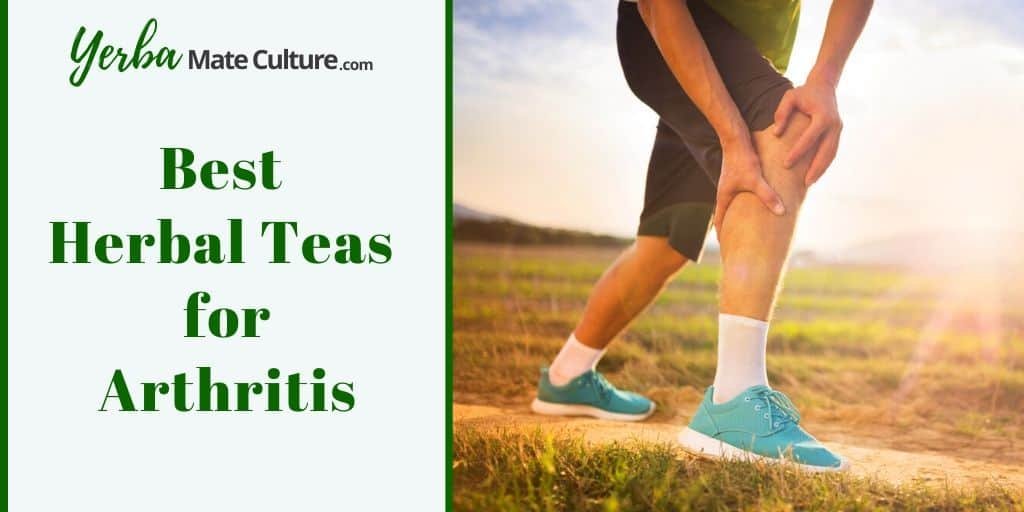


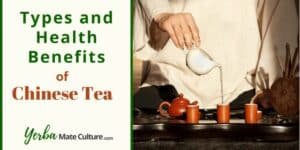
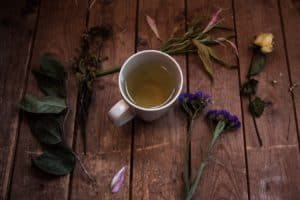
Hi Joonas.
Thank you for your very informative and in-depth research into herbal teas and remedies especially for Osteoarthritis. I do drink a lot of Green tea and Turmeric, but there are others listed that I did not know about, so many thanks I will be adding them to my shopping list.
Hi Paul,
Good to hear that you found some useful information and new herbal teas to try!
-Joonas
Great informative article. I remember my grandmother’s hands and feet being so disfigured from osteoarthritis and I hated seeing her in so much pain. I wish I had known about these teas back then. I also recall both my parents struggling with Gout. They had so much pain and the pharmaceuticals didn’t seem to offer much relief. I approach my 60’s I will keep these teas in mind. I prefer natural, holistic treatments to pharmaceuticals, I believe they are more effective and certainly have fewer side effects. While I don’t suffer from any form of arthritis at the moment I wonder if you know of a tea that can help with insomnia as that is something I struggle with? Thanks for this article.
Hi Deb,
Sorry to hear that your grandmother and parents have been suffering from arthritis symptoms.
There are many herbal teas that can help you with insomnia. You could try chamomile tea and valerian root tea, just to name a few. I have also posted an article with more information about the best herbal teas for sleeping. Maybe you can find some useful information there.
All the best,
Joonas
Hey,
This is an excellent article and topic. My Dad and my brother have arthritis, so there is a chance that I will get arthritis in the future.
I have forwarded this article on to them and I have encouraged them to comment and if they have any questions then they should get in touch.
Thank you for sharing such an informative article, and keep up the great work on your site.
All the best,
Tom
Hi Tom,
Sorry to hear that your dad and brother have arthritis. I hope my article will provide them with useful information and they can get some relief for the symptoms.
-Joonas
Hi, thanks for this. Though a long time sufferer of OA, surprising though this may seem I take no medication. I have heard of the beneficial effects of tumeric but never though of looking for a suitable herbal tea. Anyway, I followed the link on your site and just ordered myself a few boxes. I’ll see how it goes. Thanks and best regards, Andy
Hi Andy,
I hope the herbal teas that you ordered will help with your arthritis symptoms. Try to drink the tea 3 times every day to get enough of the beneficial compounds.
Great to hear that you can cope without any medication! I recommend combining the use of herbal teas with a proper diet to get more benefits. Also, you could try if hot/cold therapy would be useful.
Best Regards,
Joonas
Absolutely fabulous post. Very professional presentation, lots of great info and advice. Couldn’t have been any better. Loved the images too.
Hi Anne,
Thanks for commenting and nice to hear that you like my article.
-Joonas
Hi – This is a very informative and comprehensive post, I got to learn more about arthritis than herbal tea. I had a quick question, my aunt who has arthritis talks about Topical forms of eucalyptus leaves are used to treat arthritis pain. Her swelling & pain has reduced, she uses them regularly with heat pads to maximize the effects of eucalyptus on swollen joints – Whats your take on eucalyptus ?
Hi Satz,
I think eucalyptus is an excellent remedy for arthritis. But as you mentioned, it is best used in the form of topical treatment. That is why I didn’t include it in the list of herbal teas.
Combining heat pads with eucalyptus sounds like a great way to relieve arthritis symptoms and I think she should continue doing it, especially if she finds it useful.
-Joonas
Hi
Where can we purchase these teas?
Hi Judy,
Most of the teas introduced in this article have a link at the end of that section which points to a guide with the best products (e.g. best ginger teas) or directly to a website (e.g. Buddha Teas) where you can order it.
-Joonas
First time coming across your article when researching for natural remedy for arthritis pain which seems to have just started recently.
I am genuinely impressed and pleased about information you offered which is clear and easy to understand. You have shown that you are passionate helping ordinary people not wasting their time on medication which does work other than repeat, repeat repeat prescription.
I am retired but very active – not over weight, enjoy balanced food and hardly eat sweet things neither visit my doctor. I do not have any underling problems neither get sick often. I add natural turmeric powder to most of the food I cook.
I would be happy if can advise or suggest which of the natural remedies would better meet my need at the early stage of arthritis without depending on medication which I hate.
Thanks
Hi Kemi,
Thanks for your comment and nice to hear that you found my article useful.
Adding some turmeric powder to your foods is good and I hope it helps with your arthritis.
I recommend that you also start drinking turmeric tea 2 or 3 times a day. Here the review of my favorite product: Buddha Teas Turmeric Ginger Tea
In addition to turmeric, it contains ginger and black pepper. The black pepper will help your body with absorbing the curcumin and makes it more effective.
Just let me know if you have any other questions.
All the Best,
Joonas
I have a friend who had taken traditional medicine and a diet plan from Nze Njoku Herbal Home on google to treat Arthritis and High Blood Pressure and for some years now he looks normal. From severe pain always a sick guy Now he looks so healthy and enjoying normal productive life😊 Praise God
Hi Max,
Thanks for your comment and nice to hear that herbal medicines have helped your friend!
Best Regards,
Joonas